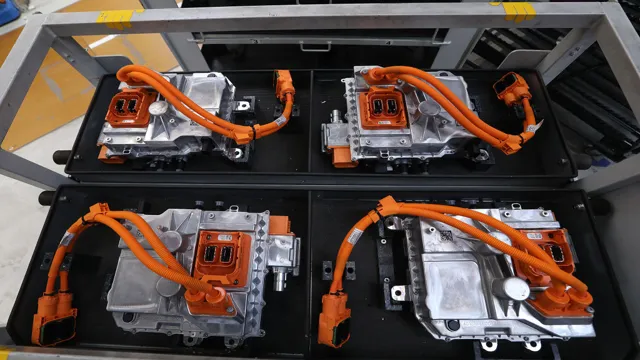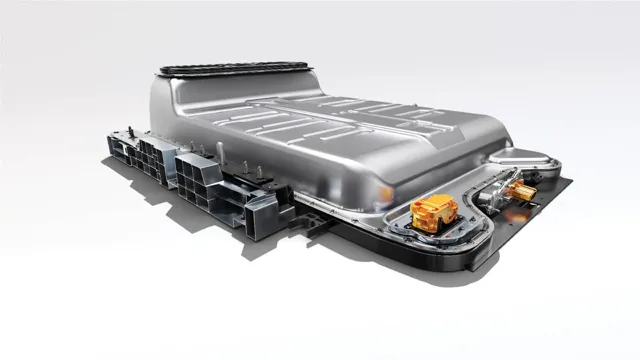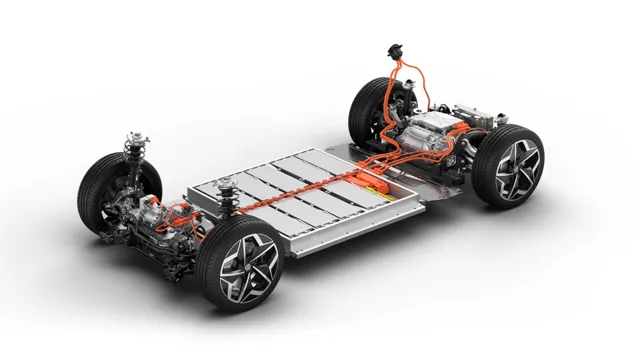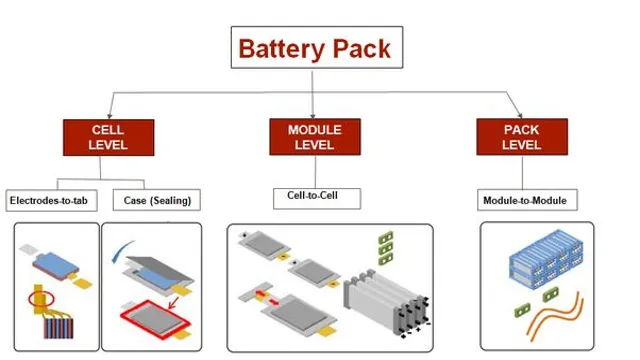The Shocking Truth: Unveiling the Average Capacity of Electric Car Batteries
Electric cars have been gaining popularity worldwide as concerns around climate change continue to grow. With advancements in technology, electric car battery capacity has become a critical factor in determining their effectiveness on the road. Battery capacity is essential in determining how far an electric car can travel before needing a recharge.
The higher the battery capacity, the farther the car can travel, making it a crucial factor for many consumers when choosing their next car. But what factors affect electric car battery capacity, and how can electric vehicle owners maximize their battery life? Let’s explore these questions in more detail and discover the impact of electric car battery capacity on the future of our transportation industry.
Overview of Electric Car Batteries
When it comes to electric cars and their batteries, one of the most important aspects is the battery’s capacity. Generally, the average capacity of an electric car battery ranges from 50-100 kWh. However, this can vary significantly depending on the specific model and make of the car.
For instance, smaller electric vehicles like the Nissan Leaf have a battery capacity of around 40 kWh, while larger, luxury electric cars like the Tesla Model S can have a capacity of 100 kWh or more. A higher battery capacity allows for longer driving ranges, so it’s important to choose a battery that aligns with your driving needs. Additionally, it’s worth noting that battery capacity can decrease over time due to regular use and environmental factors.
Regular maintenance and care can help to prolong its lifespan and optimize its performance.
What Determines Electric Car Battery Capacity?
Electric car batteries are what power electric vehicles, and their capacity lies at the heart of how far an EV can travel on a single charge. But what determines electric car battery capacity? Several factors contribute to the overall capacity, including the type of battery chemistry used, the size and weight of the car, and the efficiency of the motor and powertrain. The most common type of battery used in electric cars is Lithium-ion, which has a high energy density and can store a lot of energy in a relatively small space.
The weight of the car’s body and the battery pack also play a role, as a heavier car requires more energy to move and thus drains the battery faster. Additionally, the efficiency of the car’s motor and powertrain affects the amount of energy that is lost as heat or friction during operation. Overall, several factors influence electric car battery capacity, and understanding these factors can improve the range and performance of electric vehicles.

Factors That Affect Electric Car Battery Capacity
Electric car battery capacity can be affected by a variety of factors that play a significant role in determining the performance of the battery. Electric car batteries are made up of several individual cells that store and release electrical energy, similar to the way gas tanks store and release fuel. The total capacity of the battery and the lifespan of the battery are directly correlated to the quality and efficiency of the individual cells.
The most essential factors that can impact the battery capacity include temperature, depth of discharge, charging frequency, and driving habits. Higher temperatures can lead to a decrease in battery capacity, while frequent discharge and charging can lead to a shorter battery lifespan. Deep driving also puts a strain on the battery and can cause the vehicle to consume more energy.
It is essential to understand the impact of these factors on the battery capacity before making an electric car purchase.
Average Capacity of Electric Car Batteries
The average capacity of electric car batteries has increased significantly in recent years, as technology advances and production costs decrease. Currently, most electric cars have batteries with a capacity ranging from 40 to 100 kWh. This capacity is measured in kilowatt-hours, or the amount of energy the battery can store.
The capacity determines the range of an electric car – the further the range, the larger the battery capacity. For example, a Tesla Model S has a battery capacity of up to 100 kWh, allowing it to travel up to 400 miles on a single charge. However, it’s important to note that battery capacity can vary depending on the make and model of the electric vehicle.
The average capacity of electric car batteries is expected to continue to increase in the coming years as more and more advancements are made in battery technology.
Average Capacity of Popular Electric Cars on the Market
When it comes to electric cars, one of the most important features to consider is battery capacity. After all, the battery is what powers the car and determines how far it can go on a single charge. So, what is the average capacity of popular electric cars on the market? Well, it depends on the make and model.
Generally speaking, however, most electric cars have a battery capacity between 40 and 100 kWh. For example, the Tesla Model S has a battery capacity ranging from 75 to 100 kWh, while the Nissan Leaf has a capacity of 40 kWh. Other popular electric cars like the Chevy Bolt and the Hyundai Kona EV fall within this range as well.
Of course, the specific battery capacity will impact how far the car can go on a single charge, with higher capacities generally resulting in longer ranges. So, if you’re in the market for an electric car, be sure to consider the battery capacity so you can make an informed decision.
Trend in Increasing Electric Car Battery Capacity
Electric car manufacturers have been investing heavily in research and development to increase the capacity of electric car batteries. In the past, electric cars had a battery capacity of around 24 kWh, but today, electric car batteries contain an average of 60 kWh. This increase in battery capacity has led to a longer driving range for electric cars, making them a more viable option for long-distance travel.
Not only does this increase in battery capacity make electric cars more practical, but it also ensures that they have a better performance than their gas-powered alternatives. Imagine having a car that goes for longer distances on a single charge, and you don’t have to worry about gas prices or emissions. That’s what electric car manufacturers aim for.
As technology improves, we can expect electric car batteries to have an even higher capacity in the near future.
Future Expectations for Electric Car Battery Capacity
The average capacity of electric car batteries has come a long way since they were first introduced. In the early 2010s, most electric cars had a battery capacity of around 24-30 kWh, which gave them a range of about 80-100 miles. However, as technology has advanced, so has the battery capacity of electric cars.
Nowadays, the average capacity of electric car batteries is around 60-70 kWh, which gives them a range of about 200-300 miles. This is a huge improvement and has helped make electric cars much more practical for everyday use. Looking to the future, experts predict that battery capacity will continue to improve, with some even suggesting that we could soon see electric cars with ranges of over 500 miles.
This would be a game-changer for the industry as it would eliminate concerns around “range anxiety” and make electric cars a more viable option for long-distance travel. As battery technology continues to improve, we can expect to see even more impressive advancements in electric car battery capacity.
Comparison with Gasoline Cars
When comparing electric cars to their gasoline counterparts, one major consideration is the capacity of the battery. On average, the capacity of an electric car battery ranges from 60 to 100 kilowatt-hours (kWh). This translates to roughly 200-300 miles of driving on a single charge, which is quite impressive compared to the range of a gasoline car on a single tank of gas.
Typically, a gasoline car can go around 300 miles on a full tank of gas. However, the electric car’s range can vary based on driving habits and the type of car. Factors like speed, weather, and terrain can all impact the battery life of an electric car.
Despite this, electric cars are becoming more and more popular as their batteries improve, making them a viable option for daily commutes and long trips alike. Additionally, electric cars are also more eco-friendly than their gasoline counterparts, emitting fewer emissions and having a lower carbon footprint.
Electric Car Battery Capacity vs Gasoline Car Fuel Tank Capacity
When it comes to comparing electric cars to gasoline cars, one big area of difference is battery capacity versus fuel tank capacity. Electric cars run on battery power, which means they need to have a large enough battery to provide sufficient range for their users. Gasoline cars, on the other hand, rely on their fuel tank capacity to go the distance.
While it’s difficult to compare the two directly, electric car batteries tend to have a range between 200-400 miles, while gasoline car tanks can hold up to 20 gallons of fuel, allowing for a range of around 300-400 miles. However, it’s important to note that electric cars are more energy efficient than their gasoline counterparts, so the distance they can cover per unit of energy is actually much greater. Ultimately, when it comes to comparing battery capacity to fuel tank capacity, it depends on the specific needs and preferences of the driver.
Cost Comparison of Electric Car Battery Capacity vs Gasoline Car Fuel Tank Capacity
When comparing electric cars to their gasoline counterparts, one significant factor that stands out is the difference in battery capacity versus fuel tank capacity. Electric cars rely on battery power to run, while gasoline cars depend on fuel to power their engines. Battery capacity is measured in kilowatt-hours (kWh), while fuel tank capacity is measured in gallons.
The cost of battery capacity is higher than the cost of fuel tank capacity, which is why electric cars tend to have smaller battery capacities compared to the fuel tank capacities of gasoline cars. On the other hand, gasoline cars require frequent refueling, which can add up in cost over time. While electric car batteries may have a higher upfront cost, their lower overall maintenance and operating costs make them a more cost-effective option in the long run.
Overall, the comparison of battery capacity and fuel tank capacity underscores the advantages of electric cars in terms of energy efficiency, cost savings, and reducing greenhouse gas emissions.
Conclusion
In conclusion, the average capacity of an electric car battery can be quite shocking, as it undoubtedly varies depending on the make and model. However, it’s important to remember that bigger is not always better. While a larger battery may provide a longer range, it also adds weight and cost to the vehicle.
The key is finding a balance between capacity and practicality. So whether you’re cruising around in a Tesla or a Nissan Leaf, remember that the true measure of success lies not in the size of your battery, but in the sustainability of your ride.”
FAQs
What is the average capacity of an electric car battery?
The average capacity of an electric car battery is around 60 kilowatt-hours (kWh).
How long does it take to fully charge an electric car battery?
The charging time for an electric car battery varies depending on the charging station and the car’s battery capacity. On average, it takes around 4-8 hours to fully charge an electric car battery.
What factors affect the range of an electric car battery?
The range of an electric car battery can be affected by various factors such as temperature, driving habits, speed, vehicle weight, and use of accessories such as air conditioning.
Can an electric car battery be recycled?
Yes, electric car batteries can be recycled. The materials in the battery such as lithium, cobalt, and nickel can be extracted and reused for making new batteries or other products.






